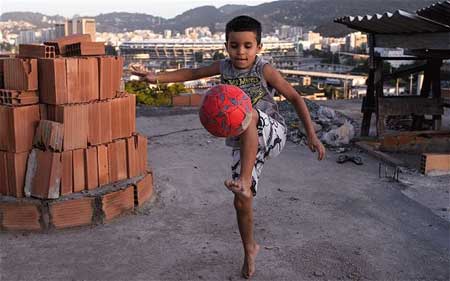巴西将让微笑重回足球

|
This World Cup exists as both a dream destination and a journey into the unknown, whether in sport, society or politics. For football, it becomes almost a spiritual voyage, a homecoming, with 32 countries all arriving in the hope of delivering a joyous carnival. How glorious and uplifting it would be if this tournament was a real celebration of the game – of what it means and the smiles it can bring. Yet set against all that there are some very well-founded fears: of whether this vast country’s infrastructure can cope, of whether the price to pay in financial and social terms is justifiable – sadly it already appears not – and, above all, whether this will be a Brazilian World Cup or merely a Fifa World Cup in Brazil. There is a difference. Four years ago in South Africa a nation was left feeling it had been used. The first World Cup to be held on the continent was not allowed to gain its own identity, a consequence of Fifa corporate gloss and sanitisation. The World Cup came; the World Cup went, and the townships were even more ghettoised – just as the favelas fear they will be this time. The legacy to Africa was questionable and its bill was obscene. Surely Brazil will not allow that to happen? The bill is already outrageous – this has become the most expensive World Cup in history, and by some distance – but surely the country is so embedded in the psyche of the sport, having held the competition in 1950 and been its main reference point ever since, that not even the slick of Sepp Blatter corporatism can submerge it? There is also, of course, the growing storm over alleged Fifa corruption to be factored in; of the stench surrounding the award of the 2022 World Cup to Qatar and the hope that this bloated edifice of an organisation might somehow be heading for reform. The purists will hope that the whole shabby affair will be parked for a month, but maybe Fifa does not deserve that. Another problem in South Africa was that the football failed to fire. It was not a tournament with matches that evoked rich memories: there was little in the way of hectic drama, or incidents of standout individual brilliance. The best World Cups, as England manager Roy Hodgson has noted, are seized by the world’s best players, whether it is Diego Maradona, Zinedine Zidane or, of course, Pele. This tournament already has so much to offer with its Brazilian backdrop that it would be a deep shame if its galácticos did not provide more of those memories. The stage is set for the established superstars – for Lionel Messi, for Cristiano Ronaldo, for Luis Suárez, although hopefully after England have quelled him. Maybe a new generation of hero will emerge in the shape of Eden Hazard, Diego Costa or Neymar. Maybe Wayne Rooney might even reignite his tournament spark? Anything is possible. Spain arrive as world champions, as double European champions, and yet no nation from their continent has won the World Cup in South America. Their task is made all the more daunting by the group in which they find themselves – one that also features Louis van Gaal’s well-drilled Holland, a rugged Australia and the thrilling dark-horses of Chile, a team that comprehensively outplayed England at Wembley last year and will provide a problem for anyone this summer. However, Spain are hardened as well as talented and their coach Vicente del Bosque will draw on last year’s experiences in the Confederations Cup, when they were crushed in the final by Brazil. Already there is talk of modifying Spain’s style of play to deal with the conditions but any objective assessment of the squad lists submitted to Fifa last week would conclude, undoubtedly, that the holders certainly have the strongest 23 players. If Spain were to triumph then this generation of their players would go down as the greatest ever in the history of football – a claim they are already close to being able to make – but there are intriguing rivals lying in every other group: a revitalised Argentina whose strike-force is so formidable that they can omit Carlos Tévez; the exciting, callow youth of Belgium, Holland and Germany; the unpredictable France, the Ronaldo-inspired Portugal and the old warhorse that is Uruguay under Óscar Tabárez. There are more: Bosnia, with Edin Dzeko; Croatia, with Luka Modric; Italy, with the seductive grace of Andrea Pirlo and, dare it be said, England, with their potential for vim and vigour should Hodgson unleash his young Lions. They, too, should be allowed to run free. And, finally, there is Brazil. Installed, inevitably, as the favourites, the biggest yoke they face is that of expectation. The nation’s footballers could not do that in 1950, when 200,000 packed into the Maracana only to watch, gobsmacked, as Uruguay emerged victorious in what is known as the Maracanazo (Maracana blow). Yet there are grounds for local optimism. In Luiz Felipe Scolari Brazil have a personality big enough and stubborn enough to deal with all of the attendant hysteria, and also one that has won the World Cup before, having led Brazil to their last triumph in Japan and South Korea in 2002. A weight was lifted last year with Brazil winning the Confederations Cup, comprehensively defeating Spain, and there was the palpable sense of a team and a nation growing in belief as that competition progressed. That win felt a long way from the nervousness that Brazil had shown in drawing 2-2 with England to celebrate the reopening of the Maracana last June when paint was still wet as the teams took to the pitch. The sight of players and supporters singing the Brazilian national anthem at the Confederations Cup, long after the music had stopped, was remarkable. Scolari has also done what he usually does in settling on his squad early: he has created the theme of the Familia Scolari, with Felipao as its father figure. Scolari expects absolute loyalty, and no dissent is countenanced within his ranks, yet he also gives back loyalty and the squad he will choose from in Thursday’s opener against Croatia is largely the same as last year’s. The fear for Brazil, for Fifa and for the authorities is what happens if theSelecao fail, and fail early. Brazilians do not revel in watching other teams play and if they are playing in their country, and a country that is paying such a high price for this World Cup, then the situation becomes hugely incendiary. The civil unrest that appears inevitable would spread like wildfire and a country that teeters on chaos even in the best of times would grind to a halt. The problem for Brazil is that better teams than this one have failed and the side lack a genuine superstar. Neymar is struggling to justify that billing to such an extent that David Luiz has become the public face of the squad. Who will win it? It would be the most magical of sporting stories for England to triumph but that frankly appears far-fetched. Spain can do it; Argentina also. But, given everything, given every adversity, every concern and every problem, maybe it is fitting that as football returns to its spiritual home that the glory also remains in Brazil. They can and, despite everything, I believe they will. |
这次世界杯不仅是作为一个梦想的目的地,而且是一个未知的旅程而存在,不管是在体育、社会还是政治层面。 对于足球来说,它几乎成为一次信仰之旅,一次精神回归,32个国家齐聚并希冀一次欢乐的狂欢。如果这次比赛是足球赛的一次庆典的话,它本身的意义以及能带来的欢乐将是巨大且振奋人心的。 然而,于此相对立的是一些已经根深蒂固的担忧:这个庞大的国家的基础设施是否能够承担,在财政和社会称谓上付出的代价是否正当——遗憾的是它似乎不能——另外,更重要的是,这将是一个巴西人的世界杯还是仅仅是在巴西的一次世界杯? 差异是存在的。四年前的南非感觉自己是一个被用过然后遭遗弃的城市。在这块大陆上举办的第一次世界杯不被允许得到自己的身份——代表着国际足联的光荣和整洁。世界杯来了,世界杯又走了,小乡镇变得更集中——就像巴西的贫民窟现在也担忧它们会重蹈覆辙一样。留给非洲的遗产是值得怀疑的,但付出的账单却是可憎的。 巴西这次一定不会让这些发生吗?账本已经让人瞠目结舌了——在某种程度上这次已经成为史上耗费最多的世界杯了——然而这个国家确实已经深深嵌入足球的灵魂中,1950年承办的那次世界杯成为它最主要的参照,这一点,布拉特团队的圆滑也掩盖不了吧? 当然,所谓的世界足联愈演愈烈的贪污风暴也被考虑在其中;卡塔尔2022年赢得世界杯主办权时弥漫的恶臭以及对这个日益膨胀的组织终将进行改革的希冀。纯粹主义者认为这些臭名昭著的事物都应该停摆一个月,但也许世界足联并不这样认为。 南非的另一个问题是足球并没有火起来。这并不是个能产生丰富记忆的比赛:没有狂热地戏剧效果,也没有展现个人才华的插曲。 最好的世界杯,正如英国教练罗伊·霍奇森所说,是被世界最好的运动员所斩获,不管他是迭戈·马拉多纳、齐达内或者,当然还有贝利。这个比赛的巴西背景赋予了它太多,如果巴西的银河舰队没有为这些美好的回忆添砖加瓦的话,将是件很丢脸的事。 这个舞台是给那些业已成名的超级巨星的——比如莱昂内尔·梅西、比如克里斯蒂亚诺•罗纳尔多、比如路易斯· 苏亚雷斯。也许新一代的像阿扎尔、迭戈·科斯塔、内马尔一样的英雄将会不断涌现。韦·恩鲁尼将会重燃斗志?所有的都有可能。 西班牙是世界冠军和欧洲杯的双料冠军,至今在南美洲还没有哪个国家拿到世界杯冠军。他们的任务就是在队伍中显得更畏缩,这些队伍包括路易斯·范加尔训练有素的荷兰队、不太稳定的澳大利亚队和令人胆颤的智利黑马,去年在温布利力挫英格兰的智利队这个夏天将会是其他人的劲敌。 不管怎样,西班牙都是愈加强硬而且聪明的,他们的教练博斯克将吸取去年在联合会杯上的教训,那时候他们被巴西在决赛中击溃。虽然已经有很多关于修正西班牙的风格以适应现状的讨论,但上星期提交给国际足联的关于参赛队员的客观评估可以推断:毫无疑问,东道主确实拥有最强的23位队员。 如果西班牙队赢了,这一代的球员将成为足球史上最强大的一支——跟他们名副其实的一份声明得以发表——但依旧有很多有趣的对手隐藏于其他队伍:复活的阿根廷队的主力如此强大以至于他们可以忽略卡洛斯·特维斯;充满活力的年轻的比利时队,荷兰队和德国队;不可预知的法国队,罗纳尔多激励的葡萄牙队,以及塔巴雷斯带领的乌拉圭老马。 还有更多:波斯尼亚有埃丁·哲科;克罗地亚有莫德里奇;意大利有富有魅力的皮尔洛,如果还敢说的话就是英格兰队,充满激情和活力的潜力足以让霍奇森释放他的年轻小狮子们。他们,同样应该自由奔跑。 最后,就是巴西队了。毫无疑问,作为最受欢迎的球队,巴西毫无疑问地面临的最大束缚就是期望。这个国家的球迷在1950年也许不该这样,那时20万人来到马拉卡纳体育场,仅仅是为了看球赛,当乌拉圭取得被誉为“马拉卡纳之殇”的胜利时,目瞪口呆。 当然,对于本土的乐观主义者也是留有空间的。在斯科拉里时期,巴西有人够强大够坚强去应对狂热地追随者,也有人已经赢得世界杯,领导巴西在2002年的日韩世界杯走向最后的胜利。 去年赢了联合会杯后巴西就把一份重担扛起来了,完胜西班牙,一种可感知的团队和国家的信仰在比赛行进中增长。上个六月为庆祝马拉卡纳体育场重开时巴西2比2平于英格兰,这场比赛让其忍受长久的紧张,当他们踏上球场时,那些油漆都还没干。球员和支持者们在联合会杯上,在音乐已经停了很久之后依旧唱着巴西国歌的场景令人难忘。 斯科拉里也做到了他以往在小组应该做的,他创造了作为领袖的斯科拉里精神,以菲利普为精神领袖。他希望绝对忠诚,他的排名也是毋庸置疑的,如今他依旧要回报忠诚,星期四对抗克罗地亚的揭幕赛他选择的小组在很大程度和去年是一样。 巴西、国际足联,以及主办方担心的是桑巴军团是否会过早失败。在自己的国家比赛巴西人是不会着迷于仅仅看别人的队伍拼杀的,这个国家对这次世界杯寄予厚望,这样现状就变得极具煽动性。不安的民众必然像野火一样蔓延,这个在混沌中摇摆不已的国家即使处于最好的时期也会慢慢停止运转。 巴西的问题在于比这次更好的团队都曾失败过,而且现在并没有天才巨星。内马尔还在挣扎着证明自己付出的如此大的精力以致大卫·鲁伊斯都成为球队名人。 谁会赢?英格兰要是胜利的话这将成为运动史话上最具魔幻的一笔,但坦白地说这确实很难。西班牙可以,阿根廷也可以。但是,鉴于所有的事,所有的困难,所有的担忧和问题,也许足球回归精神家园还是合适的,荣耀也永远属于巴西。他们可以做到,而且我也相信他们会不顾一切做到。 (译者 happy墨茗 编辑 齐磊) |
Australia had a bumpy ride through the Asian qualifying groups, losing to Oman and Jordan, En route to finishing second behind Japan to seal a world cup place. >详细>>



